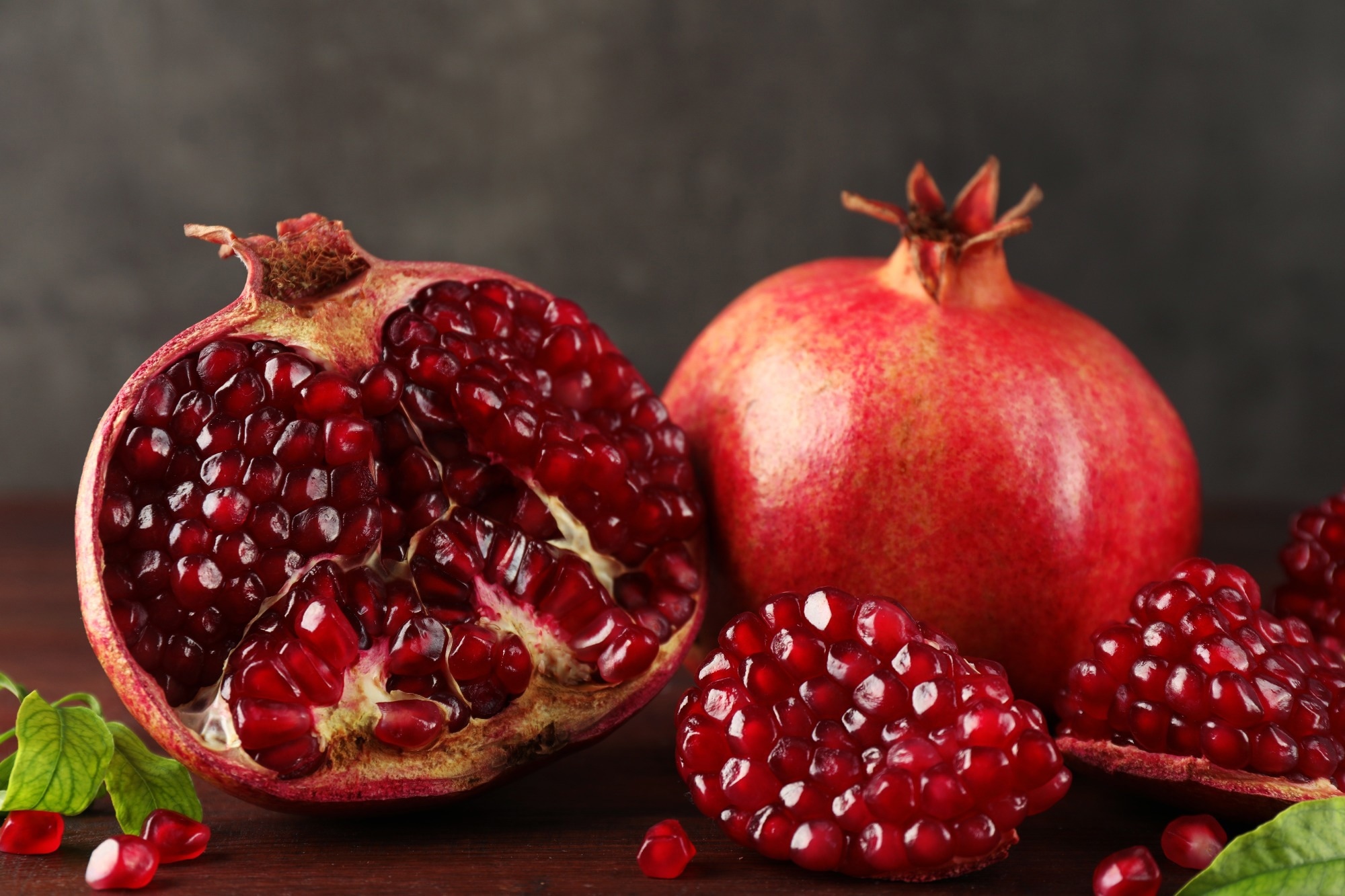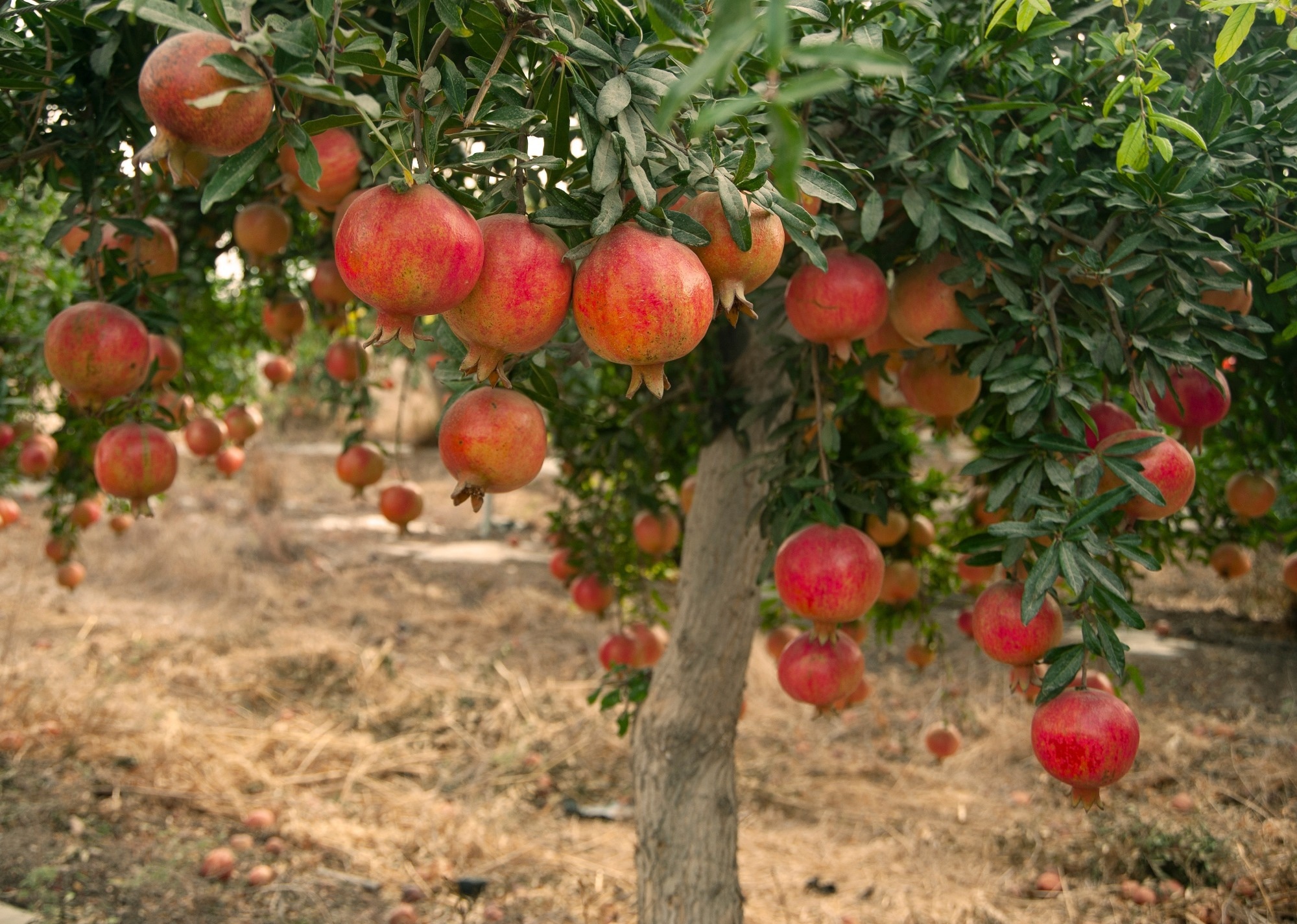Introduction
Nutritional and phytochemical profile
Antioxidant effects
Anti-inflammatory effects
Cardiovascular health
Other potential roles
Conclusions
References
Further reading
Pomegranate’s bioactive compounds such as punicalagins and ellagic acid show strong antioxidant, anti-inflammatory, and cardiovascular benefits, supporting health and longevity. Current research confirms comparable efficacy between pomegranate juice and extracts while emphasizing safe, evidence-based use.
 Pomegranate (Punica granatum) Image Credit: New Africa / Shutterstock.com
Pomegranate (Punica granatum) Image Credit: New Africa / Shutterstock.com
Introduction
Traditional practices ranging from Chinese medicine to Tibetan and Uyghur rituals have used pomegranate (Punica granatum) peel, seeds, flowers, and bark for treating stomach ailments, diarrhea, wound care, and parasite control. Today, pomegranate fruit is eaten fresh, juiced, or processed into extracts, oils, cosmetics, animal feed, and functional foods worldwide.
Recent studies have explored the antioxidant, anti-inflammatory, metabolic, cardiovascular, and anticancer effects of pomegranate components for potential nutraceutical and pharmaceutical applications.1 Modern reviews further highlight pomegranate’s role in promoting healthy aging through modulation of mitochondrial function and immune cell oxidative balance, reflecting its integration into both traditional and evidence-based medicine frameworks.3 Authoritative consumer guidance indicates that typical food use is generally safe, but people considering concentrated supplements should consult clinicians due to possible medication interactions and special situations (e.g., pregnancy, surgery, allergies).7
Nutritional and phytochemical profile
Key bioactive ingredients in pomegranate include hydrolyzable tannins and phenolic acids, particularly punicalagin, punicalin, ellagic acid, and gallic acid, as well as flavonoids such as anthocyanins. These compounds are highly concentrated in the peel, which is considered a rich reservoir of phenolic acids and hydrolyzable tannins essential to the fruit’s biological activity.
Aqueous extracts of pomegranate peel often exhibit the highest overall phytochemical yield among tested solvents. Enzymatic and microwave-assisted extraction techniques can increase polyphenol recovery compared with conventional methods. Supercritical fluid and ethanol extractions also enhance yield and preserve sensitive antioxidants, indicating that extraction efficiency influences bioactivity outcomes and potential nutraceutical applications.2
Pomegranate seeds contain anthocyanins, including pelargonidin and cyanidin glycosides, whereas the peel is particularly enriched in phenolic acids like gallic, ellagic, caffeic, and ferulic acids, as well as hydrolyzable tannins. Juice processing generates peel as a co-product rather than waste, thereby creating an opportunity to upcycle peel into high-value extracts rich in these bioactive ingredients. Pomegranate seed oil, containing up to 76% punicic acid, provides anti-obesity, anti-diabetic, and anticancer properties, making it a valuable resource for food and pharmaceutical formulations.1 Human pharmacokinetic data show that pomegranate juice and standardized extracts can yield similar systemic levels of ellagitannin metabolites when matched for polyphenol content.8

Pomegranate tree with fruits. Image Credit: grafnata / Shutterstock
Antioxidant effects
The antioxidant activity of pomegranates is attributed to high levels of hydrolysable tannins, particularly punicalagins, as well as ellagitannins, ellagic acid, and anthocyanins that directly scavenge reactive oxygen species (ROS) such as superoxide and hydrogen peroxide, chelate transition metals, and interrupt lipid peroxidation chain reactions.
These polyphenols also modulate redox signaling, with in vivo studies reporting reduced basal cytoplasmic and mitochondrial ROS in white blood cells of aged mice administered a standardized pomegranate extract, along with lower plasma malondialdehyde, a lipid peroxidation marker. Under an acute oxidative challenge with tert-butyl hydroperoxide, pomegranate extract prevented ROS surges and reduced mitochondrial hydrogen peroxide levels in neutrophils, thereby protecting innate immune cells while maintaining redox homeostasis during aging. These effects likely reflect both radical scavenging and enhancement of endogenous defenses across leukocyte subsets.3 Comparable effects have been demonstrated in human studies, where supplementation improves total antioxidant capacity and reduces biomarkers such as malondialdehyde and oxidized LDL, indicating systemic redox regulation.4
Randomized clinical trials of pomegranate preparations in adults have reported improvements in physiological endpoints linked to oxidative stress, including reduced blood pressure levels and better exercise performance after exhaustive effort. Enhanced antioxidant enzyme activities, such as superoxide dismutase, catalase, and glutathione peroxidase, have been observed following pomegranate peel supplementation in athletes, supporting recovery and resilience against exercise-induced oxidative stress.4
Anti-inflammatory effects
Pomegranate reduces nuclear factor kappa-B (NF-κB) signaling and shifts cytokine profiles toward a lower-inflammation state. Across in vivo and clinical settings, polyphenols isolated from pomegranate peels reduce tumor necrosis factor-α (TNF-α), interleukin-1α (IL-1α), IL-1β, IL-6, interferon-γ (IFN-γ), and C-reactive protein (CRP), all of which are effects consistent with NF-κB pathway inhibition.
In rodent models, pomegranate peel extract preserves antioxidant-detoxification gene expression and reduces lipid peroxidation, thereby preventing pro-inflammatory cytokine release. In humans, reductions in systemic inflammatory mediators accompany improved oxidative stress indices, thereby supporting a coupled antioxidant and anti-inflammatory mechanism. Newer systematic reviews confirm that pomegranate peel supplementation consistently lowers IL-6 and CRP levels post-exercise and during metabolic stress, reinforcing its dual redox–inflammatory modulation properties.4
Obese women with knee osteoarthritis receiving pomegranate peel extract showed biochemical evidence of reduced oxidative stress, along with improved enzymatic defenses that modulate upstream inflammatory signaling. In metabolic conditions, patients with non-alcoholic fatty liver disease and animal models of metabolic syndrome demonstrated anti-inflammatory and lipid-modulating benefits from peel intake, including lower low-density lipoprotein cholesterol (LDL-C) and inflammatory markers such as CRP and serum amyloid-A. These results parallel preclinical observations of NF-κB inhibition and attenuation of inflammatory cascades in muscle and vascular tissues, underscoring broad anti-inflammatory potential.4
Cardiovascular health
Short-term randomized trials report small reductions in systolic and diastolic blood pressure, likely due to improved nitric oxide bioavailability and reduced oxidative stress. Although some studies reported improved flow-mediated dilation and lower IL-6 levels, pomegranate supplementation does not significantly affect adhesion molecules like intercellular adhesion molecule-1 (ICAM-1), vascular cell adhesion molecule-1, and E-selectin. However, consistent IL-6 reduction and minor improvements in endothelial function suggest that pomegranate’s vascular effects are mediated primarily by anti-inflammatory and antioxidant actions rather than direct modulation of adhesion molecules.5
Across clinical studies, changes in total cholesterol and LDL-C are inconsistent; however, anti-atherogenic mechanisms are supported by reduced oxidized lipoproteins and improved macrophage cholesterol handling. Small trials conducted in high-risk groups suggest slower atherosclerotic progression markers, which align with the polyphenol-rich profile of pomegranates, which protect against nitric oxide signaling and lipid peroxidation. Meta-analyses indicate that continued intake may benefit arterial stiffness and oxidative status, even when lipid outcomes are modest.5
In metabolic syndrome, early evidence from both children and adults suggests potential benefits for vascular health and broader risk factors. These improvements have been most apparent in inflammatory and oxidative stress markers, with occasional favorable shifts in blood pressure or lipid subfractions. However, heterogeneity in study design, small sample sizes, and varied preparations limit these results, necessitating larger, longer trials using standardized products to optimize dosing.5
Other potential roles
Preclinical and early clinical studies suggest anti-proliferative and pro-apoptotic effects of pomegranate extract in breast and prostate contexts, alongside potential anti-angiogenic effects. These observations are similar to those observed with pomegranate interventions, which have been shown to reduce systemic inflammation in humans. Detailed mechanistic analyses reveal inhibition of multiple oncogenic pathways, including PI3K/Akt, MAPK, and NF-κB, while promoting apoptosis by upregulating caspase activity and suppressing metastasis-related signaling.6
Ellagitannins are transformed into bioactive metabolites that may influence host inflammation and oxidative stress, which suggests that regular intake could support intestinal homeostasis. This microbiota-polyphenol axis is a plausible contributor to downstream metabolic and immune benefits observed in human studies. Emerging data also suggest that gut-derived urolithins mediate mitochondrial biogenesis, potentially linking pomegranate consumption to systemic energy metabolism and cellular longevity.3
Topical and oral pomegranate preparations are being explored for photoprotection, wound repair, and attenuation of erythema, with proposed benefits including reduced oxidative damage, modulation of inflammatory mediators, and support of extracellular matrix integrity. Collectively, these effects warrant rigorously designed trials to confirm efficacy, define doses, and clarify which patient groups benefit most.6
Conclusions
Across clinical and mechanistic studies, punicalagins, ellagic acid, and anthocyanins consistently reduce oxidative stress, modulate NF-κB signaling, and improve vascular parameters, including blood pressure and endothelial function. Clinical trials also suggest benefits for lipid oxidation, exercise recovery, and selected cognitive outcomes. Comprehensive evidence now supports pomegranate-derived products as multi-target nutraceuticals that aid redox balance, control inflammation, and mitigate age-related functional decline, though standardized formulations remain critical for reproducibility.1–6 In practice, both juices and standardized extracts can achieve comparable levels of ellagitannin metabolite exposure when matched for polyphenol content,8 and consumers should follow established safety guidance and consult a clinician when using concentrated products or when taking medications.7
References
- Wang, J., Sun, M., Yu, J., et al. (2024). Pomegranate seeds: A comprehensive review of traditional uses, chemical composition, and pharmacological properties. Frontiers in Pharmacology 15. DOI:10.3389/fphar.2024.1401826, https://www.frontiersin.org/articles/10.3389/fphar.2024.1401826
- Azmat, F., Safdar, M., Ahmad, H., et al. (2024). Phytochemical profile, nutritional composition of pomegranate peel and peel extract as a potential source of nutraceutical: A comprehensive review. Food Science & Nutrition 12; 661–674. DOI:10.1002/fsn3.3777, https://onlinelibrary.wiley.com/doi/10.1002/fsn3.3777
- Verdú, D., Valls, A., Serna-García, M., et al. (2025). Pomegranate Extract Modulates Oxidative Stress by Reducing Basal ROS Levels and Protecting White Blood Cells from Induced Oxidative Damage in Aging Mice. International Journal of Molecular Sciences 26(13). DOI:10.3390/ijms26135957, https://www.mdpi.com/1422-0067/26/13/5957
- Ayubi, N., Syafawi, A., Fitria, R. A., et al. (2025). Effect of Consuming Pomegranate Peel Supplements to Improve Recovery from Oxidative Stress and Inflammation Post-Exercise: A Systematic Review of Randomized Controlled Clinical Trials. Pharmacological Research-Modern Chinese Medicine 16. DOI:10.1016/j.prmcm.2025.100676, https://www.sciencedirect.com/science/article/pii/S2667142525001034
- Asgary, S., Karimi, R., Joshi, T., et al. (2021). Effect of pomegranate juice on vascular adhesion factors: A systematic review and meta-analysis. Phytomedicine 80. DOI:10.1016/j.phymed.2020.153359, https://www.sciencedirect.com/science/article/pii/S0944711320301902
- Rauf, A., Olatunde, A., Akram, Z., et al. (2025). The role of pomegranate (Punica granatum) in cancer prevention and treatment: Modulating signaling pathways from inflammation to metastasis. Food Science & Nutrition 13(2). DOI:10.1002/fsn3.4674, https://onlinelibrary.wiley.com/doi/10.1002/fsn3.4674
- NCCIH (2025, April). Pomegranate: Usefulness and Safety. National Center for Complementary and Integrative Health. https://www.nccih.nih.gov/health/pomegranate
- Seeram, N.P., Zhang, Y., McKeever, R., et al. (2008). Pomegranate Juice and Extracts Provide Similar Levels of Plasma and Urinary Ellagitannin Metabolites in Human Subjects. Journal of Medicinal Food 11(2):390–394. DOI:10.1089/jmf.2007.650, https://europepmc.org/article/med/18598186
Further Reading
Last Updated: Oct 29, 2025